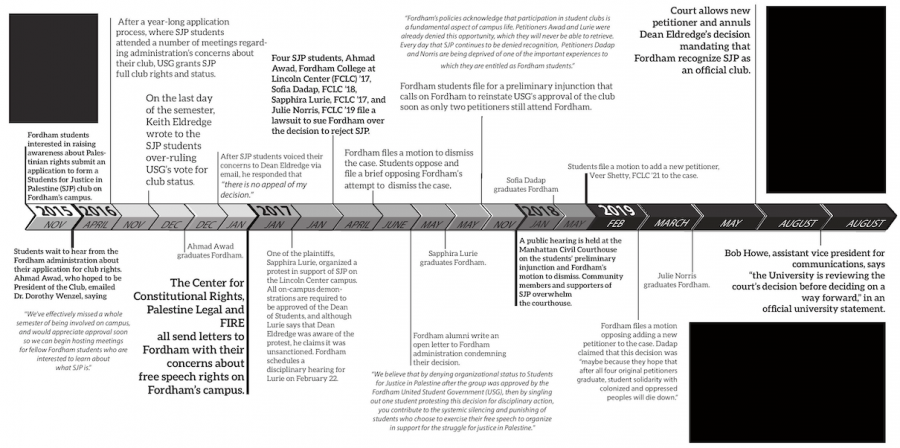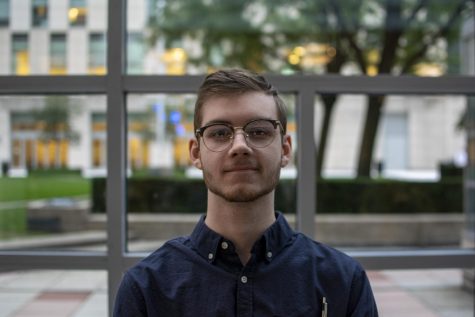SJP’s Win Is a Victory for All of Us
August 25, 2019
In 2016, they came together to form a club. They applied for official status. They were approved by United Student Government (USG), but denied by Dean Eldredge. A lawsuit was filed, a legal advocacy group hired and petitioners recruited. Some of those petitioners graduated, and new student leaders stepped up to take their place. Now, years later, their labors finally bear fruit, and on Aug. 6, 2019, Fordham was ordered by Judge Nancy Bannon to recognize Students for Justice in Palestine (SJP) as a formal club on campus.
It is difficult to overstate the importance of this victory.
It has been well-documented by the progressive Center for Constitutional Rights that pro-Palestinian student activists face undue and disproportionate opposition to their advocacy — opposition enforced by college administrators like Dean Eldredge, in violation of the school’s own principles of free speech and diversity of ideas. These are, of course, the same principles cited as justification for overruling far greater student-led and faculty-supported opposition, such as that facing Roger Stone’s invitation to Fordham.
University administrators across the nation should look at the wording of the decision and take warning: capricious and unjustified selective enforcement of standards that other groups are not held to does not stand up in court. Such actions are no better than politically motivated censorship and will be judged as such. Pro-Palestinian activists should take heart and use this decision as precedent in defense of their own advocacy against the next stonewalling of their efforts.
For us at Fordham, the repercussions go far beyond SJP alone. After all, the Palestinian exception is only a symptom of a greater pattern of hypocrisy and arbitrary control over discourse. The University’s draconian attitudes towards free speech and student power are well-known and long-standing, but for the first time in a while, they’ve been forced to capitulate. The administration has always been at an advantage because change takes time — time to build relationships, make connections, persuade, compromise, negotiate and, yes, litigate. Students have a mere four years full of classes, internships, summer vacations and all the other routines of college life.
What this court decision proves is that students can organize across the necessary time scales, passing the torch from one cohort to another so that they may keep the fire burning. Further, it proves that we can do so and win. This case should serve as a warning to Fordham’s administration: the balance of power is not so skewed in their favor that they can expect to get away with trampling student voices underfoot.
SJP’s victory should herald a new era of cooperation between administration and students. After all, a more even balance of power means a more healthy relationship, and this display has leveled the playing field a bit. It’s been proven that decisions unpopular with the student body cannot go unchallenged and that some of those challenges will result in less-than-desirable optics for Fordham University. Administrators are incentivized to work with, rather than against, students — and students should feel emboldened to do so, secure in the knowledge that Fordham is less eager to pick fights with a bloody nose.
For now, the “S” of SJP can rejoice and revel in their victory. Through the bold efforts and dedication of the club’s founders, they finally have an opportunity to champion their cause on campus. To echo the words of USG back in 2016 when they put their support behind the club, I have faith that SJP and its members will positively contribute to our community in a respectful and sensitive manner. I expect it will promote open academic discussion, diversity of thought and intellectual rigor, and that Fordham will remember its commitment to the pursuit of such. I trust that its members will prove Dean Eldredge wrong, and, far from being a polarizing presence on campus, will bring students together in support of humanitarian values and the rights of the Palestinian people. And above all else, I believe that all of us at Fordham can take advantage of this chance the leaders of SJP have won for us, and bring about a new era of open discourse without undue administrative sanitization.












Jake • Aug 27, 2019 at 9:22 am
I have been following this case for a while for personal reasons, and I am sorry to say that I find myself disappointed in your representation of the situation. As a journalist, rather than as a member of the interested party, I believe your responsibility should have been to devote at least a sentence or two on the views of the opposition. The main thrust of your article speaks of the rights of students and of free speech. I am a strong proponent of the first amendment and believe in the rights of all to add their views to the pot, regardless of how opposed I may be to their message, because giving anyone the power to muzzle another risks giving them the power to decide whom they wish to muzzle. However, we are also all familiar with the old adage of screaming fire in a crowded theatre and how the danger it may create might outweigh the pure right to free speech. The question of course, as in most issues, is where that line is drawn. I wonder if your article would look the same regardless of which students were seeking free speech and what their message was. If suddenly there was a small contingent of students who wanted to start a white supremacist club on campus would your piece read the same way? I think we can both agree on how detestable that would be (at least I hope so) yet doesn’t that make you an arbitrary arbiter of who is entitled to free speech? That is what makes free speech such a nuanced issue, one not nearly as obvious and straight-forward as your article represents. I wonder if you are aware that the National SJP website states that “NSJP’s work is centered on freedom, justice, and equality for the Palestinian people, who have been living without basic rights under Israeli military occupation and colonialism since 1948”. The year 1948 means that according to the National SJP organization, Israel has no right to exist, since they consider it colonization from the moment Israel was declared a state, rather than 1967, the year stated by most others when discussing this issue (in fact 1948 was only shortly after Jordan was declared a state, which was also part of what was called Palestine. I have always wondered why they were not afforded the same wrath or called occupiers despite being 80% Palestinian). An organization devoted to protecting the rights of some by destroying others is not the same as one that is purely devoted to protecting people’s rights. They have also many times presented very anti-Jewish imagery and statements. The reason I state all of that is because you neglected to mention that Fordham requested that their club bear a different name, rather than one that carried so many negative connotations. They could have called themselves “Homeland in Palestine” or ‘Palestinian Rights Association”, or any name that would have represented their cause. But they refused. I believe this to be a very significant omission on your part. I cannot profess to know what compelled them to refuse, but as an objective journalist, it should at least be a question. SJP, both nationally and on various campuses, has a history of saying and doing anti-Jewish things. To ignore this completely is to turn a blind eye towards the discrimination of one group in an attempt to defend another. I would have liked to see you address that concern for at least a sentence or two. You also closed the piece with a quote from the USG about their “faith that SJP and its members will positively contribute to our community in a respectful and sensitive manner”. You also stated that you “trust that its members will prove Dean Eldredge wrong, and, far from being a polarizing presence on campus, will bring students together in support of humanitarian values and the rights of the Palestinian people”. If that is not the case and Jewish students feel intimidated or threatened, I wonder if USG will hear the small Jewish minority on campus. Will you?
DNChickenz • Aug 27, 2019 at 1:44 am
Yeah based on my own USG experiences…not sure I really think they’re positive or respectful at all? More like unstable and slightly vicious? Kind of just crazy in general. But I agree with you on the importance of free speech. There’s a chance things might get ugly fast, but that’s the price of eliminating censorship/excessive political correctness. And I think we can agree that it’s worth that price for the sake of the majority of students being able to speak as they please at Fordham